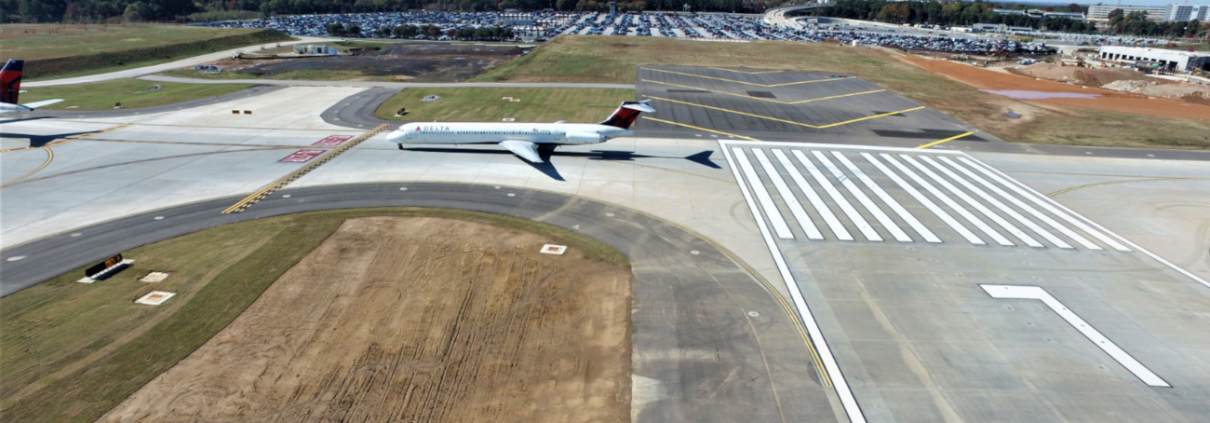Taxiway and Runway 9L Pavement Replacement Project at the Hartsfield-Jackson Atlanta International Airport Earns Envision Silver Award for Sustainable Infrastructure

View of the Taxiway and Runway 9L Pavement Replacement Project at the Hartsfield-Jackson Atlanta International Airport (Envision Silver, 2019)
The Taxiway and Runway 9L Pavement Replacement Project at the Hartsfield-Jackson Atlanta International Airport (ATL) located in Atlanta, Georgia is the recent recipient of the Envision® Silver award for sustainable infrastructure.
ATL serves as a primary transfer point in the national air transportation system, with more than 107 million passengers and over 898,000 aircraft operations, making it the world’s busiest passenger airport. Each day ATL handles approximately 6.6% of the nation’s travelers, leading many aviation experts to consider it the most important node in the United States and one of the most important globally.
The $55 million project at ATL consists of multiple elements, including replacing pavement in the Center Airfield Complex and portions of runway 9L-27R and adjacent taxiways, adjusting airfield lighting and signage, relocating drainage structures and drainage lines, constructing an embankment, adjusting airfield striping and navigational aid (NAVAID) structures. Deficient runway safety areas on runway 9L-27R will be regraded to conform with Federal Aviation Administration (FAA) regulations.
The performance of the project post-completion will be monitored by several existing ATL programs, systems, and initiatives such as the airport’s Pavement Management Program, Safety Management System, ISO 50001 certified Energy Management System and Noise Compatibility/Mitigation program.
“Hartsfield-Jackson Atlanta International Airport and the City of Atlanta are focused on instituting sustainability in all construction projects and we met the Envision goals using several methods used on past projects by using recycled materials, LED lighting and protecting the groundwater”, said Department of Aviation Director Norma Click.
Atlanta’s Department of Aviation (DOA) worked in close collaboration with the Aviation Infrastructure Solutions joint venture team (Michael Baker International, Pond & Company (Pond) and Corporate Environmental Risk Management (CERM)) to deliver this award-winning sustainable project.
“The Envision rating system provided the owner, design and construction team with a method to measure the difference that they are making to the environment”, said AIS Engineer Mackenna Perkins.
The Envision sustainable infrastructure framework assesses project sustainability across five categories: Quality of Life, Leadership, Resource Allocation, Natural World, and Climate and Resilience. These key areas contribute to positive social, economic, and environmental impacts on a community during the planning, design, and construction of infrastructure projects.
Some of the factors contributing to the ATL Taxiway and Runway 9L Pavement Replacement Project earning an Envision Silver include:
QUALITY OF LIFE
Long-term sustainable growth and development—an overall increase in aircraft operations, including greater use of wide-body aircraft is forecast at ATL. However, numerous pavement slabs on Runway 9L have the lowest structural capacity in the ATL pavement network, making these areas unable to accommodate projected load increases. Furthermore, given the importance of ATL to the nation’s aviation network, minimizing service disruptions is of critical importance. Therefore, replacing pavement on runway 9L – the airport’s longest runway – to accommodate larger aircraft while prolonging its useful life to more than 20 years before any major rehabilitation is required, will be two of the main outcomes of this project.
Job creation—an analysis of the estimated construction costs for this project shows that approximately 540 full-time equivalent jobs will be created during construction. This represents about 1% of the direct employment (63,000 positions) at the airport, from airline, ground transportation, concessionaire, security, federal government, City of Atlanta and airport tenant jobs.
LEADERSHIP
Implementation of a sustainability management plan—sustainability is a department-wide commitment for the DOA. ATL’s Director of Asset Management and Sustainability lead the development of a Sustainability Management Plan (SMP) for the DOA and ATL during a 12-month planning period that included extensive stakeholder and public engagement efforts. The SMP development process enabled the DOA to determine ATL’s baseline inventories, evaluate the benefits of ongoing sustainability initiatives, identify opportunities for improvement, and develop goals and targets for future sustainable management practices at the airport. It guided the development of this project and has been adopted for all DOA operations. The SMP calls for specific initiatives to reduce traffic congestion and associated emissions, develop and implement a stormwater pollution prevention plan and improve construction phasing and safety outcomes.
RESOURCE ALLOCATION
Recycled and regionally sourced materials—82,000 tons of material used on the project have been identified as having recycle/reuse potential. At least 90% (by weight) of project materials are being sourced locally to minimize transportation costs and impacts and retain regional economic benefits.
NATURAL WORLD
Protection of surface and groundwater quality—during construction, best management practices will be implemented to properly manage onsite hazardous materials to prevent surface and groundwater contamination. After construction of this project is completed, water quality will be monitored and maintained by ATL’s airport-wide stormwater pollution prevention plan. Also, impervious areas at ATL will be reduced by 12% as a result of this project, thereby increasing infiltration capacity and reducing runoff.
CLIMATE AND RESILIENCE
Assessing climate risk—ATL adopted the City of Atlanta’s Climate Action Plan (CAP) which identifies climate change risks and appropriate responses. The CAP calls for a 40% reduction in greenhouse gas emissions below 2009 levels by 2030 and identifies a number of innovative measures for implementation at ATL, including improving passenger access by improving the public transportation network, imposing an aircraft emissions charge, and participating in climate change research and related programs.
“The project team’s thoughtful and practical approach to sustainability and their use of Envision to help guide their efforts to achieve excellence in sustainable performance is commendable,” said Melissa Peneycad, ISI’s Managing Director. “ISI is pleased to present the Envision Silver award to ATL’s Taxiway and Runway 9L Pavement Replacement Project.”
FOR RELEASE – ATL Taxiway and Runway 9L Pavement Replacement Project Earns Envision Silver



